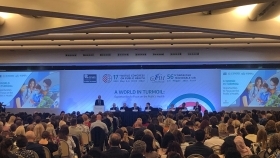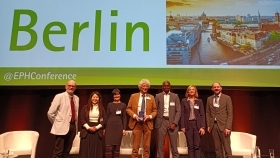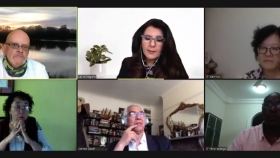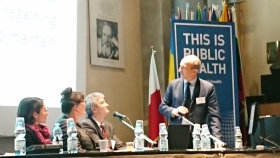
by strengthening education and training
of public health professionals
for both practice and research



The Association of Schools of Public Health in the European Region (ASPHER)
ASPHER is the key independent European organisation dedicated to strengthening the role of public health by improving education and training of public health professionals for both practice and research.Secretariat updates
Joint Statement of Students and Professors from Serbia
Public Health Diplomacy in Action:
The Voices of Serbian Students
Download a pdf version of the statement here.
We address you today not only as professors of medicine and public health, but also as witnesses and supporters of an extraordinary and powerful democratic movement unfolding in Serbia, led not by political figures or institutions, but by students.
Serbia and Its Academic Landscape
Serbia is a country with a population of approximately 6.6 million people. Our higher education system comprises nine public universities, over 70 faculties, and more than 220,000 students. This population of young people represents our country’s most vital potential – and a driving force for its prosperous future and development.
In recent months, Serbian students have demonstrated what it truly means to stand for the values of justice, democracy and public health diplomacy. With dignity and resolve, they have mobilised in defence of truth, safety, and institutional justice. These are the values that go to the heart of our mission as educators and public health professionals.
These students, soon to be our future physicians, public health professionals, scientists, and community leaders, have chosen the difficult path of ethical resistance and democratic engagement in a time of deep societal crisis, demonstrating immense courage in the pursuit of justice
Peaceful, Civic, Public Health Activism
Following a tragic incident on November 1st, 2024, in which 16 lives were lost due to the avoidable collapse of a train station structure in Novi Sad, students from across Serbia mobilized peacefully and purposefully.
When denied access to national media due to limited media freedom, they did not withdraw – they became messengers of democratic values. They walked hundreds of kilometres across Serbia to speak directly with citizens in small towns and rural areas, ensuring their voices could not be silenced. They organized peaceful protest actions across university campuses and city squares.
But their efforts didn’t stop at national borders.
In an act of courage and sacrifice, Serbian students bicycled from Belgrade to Strasbourg and completed a relay race from Belgrade to Brussels, crossing European capitals to hand over their demands directly to the European Union institutions. Along their route, they encountered solidarity and support from European citizens and the Serbian diaspora.
In Vienna, Austria’s Minister of Foreign Affairs, Beate Meinl-Reisinger, greeted them with these powerful words: “What you are doing is unbelievable, so brave.” She recognised that Serbian students were promoting the very same values that define the European Union – freedom, human rights, democracy, and the rule of law.
Although exceptional, these are not the first student-led protests for social justice. What we are witnessing in Serbia is part of a continuation of the global democratic tradition. For example, in 1968, students in France sparked one of the most significant societal transformations in post-war Europe. In 1989, students in Prague led peaceful protests that contributed to the Velvet Revolution and the fall of communism in Czechoslovakia. In Chile, students have led mass demonstrations since 2011, demanding accessible and equitable public education. More recently, climate justice movements led by young people across the globe, from Sweden to Uganda, have demonstrated that young people are at the forefront of ethical leadership.
The Serbian students of today stand proudly within this lineage.
A Movement of Courage and Creativity
As health professionals and educators, we are obligated to reflect on societal processes through the lens of ethics, equity, and the social determinants of health. We cannot stay silent when injustice, corruption, and the erosion of civil rights harm the very fabric of our communities.
Serbian professors joined the students’ protests in solidarity. The Faculty of Medicine at the University of Belgrade went on strike on May 5th, 2025. This decision was based on multiple reasons: the failure of state institutions to respond to legitimate student demands; illegal reduction of public financing of academic research adopted by a government operating under a technical mandate; unacceptable threats and public humiliation directed at students and faculty staff; and repression of university leadership by law enforcement.
This is not only a political issue, but also a public health matter. Democracy, human rights, freedom of speech, academic and professional integrity, justice, and institutional trust are fundamental social determinants of health.
Students’ Legitimate Demands
The Serbian student movement has articulated a series of clear and justified demands:
- Full transparency and accountability regarding the reconstruction of the Novi Sad train station. All relevant documentation concerning the reconstruction of the Novi Sad Railway Station must be made public.
- Legal action against unlawful violence perpetrated against peaceful protestors. 2. The relevant authorities must confirm all persons suspected of physically assaulting students and professors, and criminal proceedings should be initiated against them. If they hold public office, they must be dismissed.
- Dropping charges against arrested students, as per the rule of law. Criminal charges against arrested and detained students during the protests must be withdrawn, as well as the suspension of already initiated criminal proceedings.
- A 20% increase in funding allocated to state universities needs to be ensured, safeguarding equitable access to education.
- An investigation and sanctions for the use of unidentified and harmful crowd-control measures, including the alleged use of sound cannons on peaceful demonstrators. A thorough investigation by the competent authorities must be conducted to determine all circumstances and liabilities regarding the phenomenon that caused fear and panic during a peaceful protest on March 15, 2025.
- Accountability in medical teaching institutions for ethical and legal breaches of patient privacy and safety. Protection of patients' rights must be ensured.
It is clear that the core of the students’ movement is not ideological, but about social justice, human rights, and the rule of law.
The Power of Public Health Diplomacy
What we are witnessing in Serbia is not just a national protest—it is an act of public health diplomacy from within. Students are not only demanding justice at home—they are building bridges abroad, engaging with European values, and using peaceful, evidence-based advocacy to reclaim democratic space through public health ethics.
Their journey from Belgrade to Brussels was more than symbolic. It was an act of citizen diplomacy, performed by those with no political mandate—only moral authority and civic courage. These students turned their bicycles and running shoes into instruments of dialogue, bypassing captured media systems to reach people directly.
This is the very essence of public health diplomacy: using health-based values – dignity, equity, truth as the language of international engagement. The Serbian student movement has made public health an actor in democratic dialogue. They’ve shown that even non-state actors, especially youth, can speak with global resonance.
Their efforts demonstrate that diplomacy today extends beyond the realm of foreign ministers and ambassadors. It also belongs to students, scientists, and health professionals, who act to defend public interest through transnational solidarity and the pursuit of truth.
Our Shared Responsibility
We, professors and public health educators, must stand in solidarity with those who fight for all our shared European values. Students' courage is not only Serbian. It is European. not solely Serbian- It is European. It is global. It is ours. It is global. It is ours. Let this be a moment of transnational solidarity.
Serbian professors and students are protesting to protect human rights, public health, and the future of their country.
Today, we support our students to ensure health and well-being for everyone tomorrow. Let their action awaken us. Let it bind us in a collective purpose.
We, the students and professors from the Faculty of Medicine at the University of Belgrade, proudly join in signing this statement. Bound by our dedication to ethics, human dignity, and democratic principles, we endorse the peaceful movement for justice, transparency, and accountability within Serbian institutions.
|
Students (alphabetical order): |
|
|
1. Aleksandar Breslijev |
|
|
2. Andrijana Ristic |
|
|
3. Veljko Stojanovic |
|
|
4. Djordje Udovcic |
|
|
5. Jana Stevanovic |
|
|
6. Lazar Dimitrijevic |
|
|
7. Lena Stokic |
|
|
8. Luka Jankovic |
|
|
9. Marko Lazarevic |
|
|
10. Mia Cukovic |
|
|
11. Mila Martic |
|
|
12. Nikola Tosic |
|
|
13. Nikolina Stanimirovic |
|
|
14. Ognjen Pokimica |
|
|
15. Petar Stojkovic |
|
|
16. Sara Jovovic |
|
|
17. Stefan Jurik |
|
|
18. Tara Radak |
|
|
19. Uros Novakovic |
|
|
20. Filip Simovic |
|
Terms of use · Transparency statement ·Tel: +32 2 735 0890 ·Skype: ASPHERskype ·Mail: office@aspher.org ·Share:
ADDRESS
Aspher SecretariatUM Brussels Campus
Av de l'Armée / Legerlaan 10
BE-1040 Brussels





